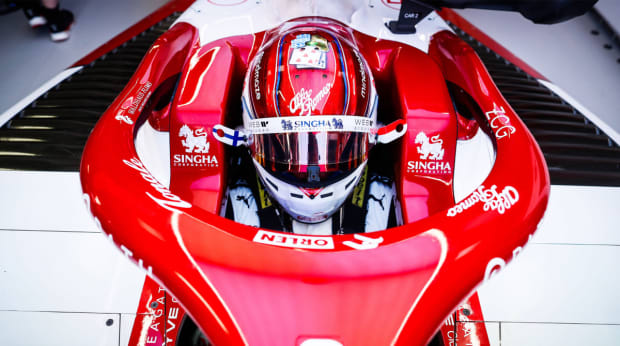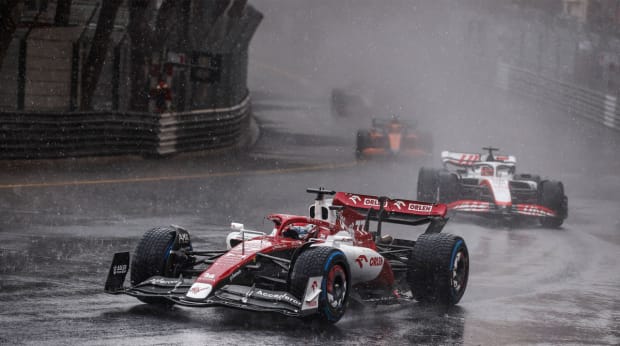Valtteri Bottas is known for many things.
He is a veteran in the Formula One circuit, embarking on his 10th season. A calm but fiercely determined driver, he has accumulated 10 wins, 20 poles and 67 podium finishes. The former teammate of seven-time world champion Lewis Hamilton, the Finland native is now headed to the third team in his storied F1 career: Alfa Romeo. And, he’s the driver with the bum photo that raised more than $50,000 for charity.
He’s known for his love for biking and coffee, gravitating toward flat whites and espressos but will not use sugar. What some Formula One fans may not know is that his passion reached new levels during the COVID-19 pandemic. He co-owns Kahiwa Coffee Roastery in Lahti, Finland.
The 32-year-old heads to Baku, Azerbaijan, with the belief that Alfa Romeo has the potential to “fight towards the front” as a podium finish continues to allude Bottas after seven races. The Azerbaijan Grand Prix has been a roller-coaster track for him in recent years—finishing 12th in 2021, winning in ’19, losing the lead after running through debris in ’18 and narrowly going past Lance Stroll for second place in ’17.
Could Sunday be when Formula One fans see the full potential of the package and Bottas’s Alfa Romeo era?
As F1 heads to Baku, Sports Illustrated spoke with the coffee enthusiast about his passion beyond the grid, key parts of the street circuit to keep an eye on this weekend and much more.

IMAGO / PanoramiC
Fuel for Thought is Sports Illustrated’s exclusive Q&A with Formula One’s biggest names. The following questions and answers have been edited for brevity and clarity.
Sports Illustrated: How is Baku?
Valtteri Bottas: Baku is sunny. It’s quite warm. The track looks identical to the years before. No changes really on the track.
SI: How do you feel about not having any changes to the track?
VB: It’s sometimes nice to have differences and changes, but I think this track works as it is. It’s always produced quite an interesting race mainly because of the long straight. It opens up opportunities for overtaking, and with the technical sections and the track being a street track, you know it makes it quite unpredictable. People are making mistakes, and there’s things happening so it’s a good place for a grand prix.
SI: What should we be watching for at Baku? What part of the track is the most challenging and why?
VB: The most challenging part is the section in the middle of the track, which gets into the old town. It’s super narrow, and it’s quite hard to judge, especially nowadays with the big new cars, how close you are to the wall in places. So I think that’s where we’re probably going to see some mistakes from drivers. And then also what is going to be a quite important thing this weekend is the strength and speed and trying to avoid porpoising, the cars bouncing up and down the straight. The teams that can avoid it here will have an advantage because of the long and bumpy straight.
It’s going to be difficult to predict where we’re going to be as a team, but for sure fighting for some solid points hopefully again.
SI: What is that feeling of porpoising like?
VB: You definitely feel it the next day. But luckily our car hasn’t been that bad for it so we haven’t had major issues. It’s just the way the ground effect works, and if it starts to be unstable, then that starts to happen. But I think every team has learned already how to avoid it.
SI: What was it like adjusting to the car this season with all the new changes in the technical regulations?
VB: Actually easier than I thought. There was quite a few changes, and the whole philosophy of the aerodynamics of the cars is different but actually wasn’t that different from driver’s point of view. The main thing you feel is the car’s a bit heavier so in a way it feels a bit more lazy, like in a change of direction. But the tire is actually not that different.
I would say the main thing for me was getting used to the new team because, for example, all the functions in the steering wheel are completely different than what I’m used to, the terms that we speak about the car and the setup.
SI: How did you adjust to the new team, especially mentally?
VB: I mentally started on a completely fresh page. Took all of the experience I’ve had with four years at Williams and five years with Mercedes, and just a new chapter. Reset all the goals for the season, and made the main goal to be progress and enjoy it at the same time. I think that’s what we’ve been able to do and consistently scoring points. It’s been good fun, but also seeing the motivation in the team that everyone now kind of wants a bit more. That’s really, really healthy.
The feeling at the moment for me is I definitely wouldn’t want to be in any other place.
SI: Is there a race this season that you’re particularly proud of even though we are still early on?
VB: It’s still early on. I would say the first race, for sure, was really amazing. You know, together with a team and both cars scoring points. That was pretty amazing. But then some of the qualifying results like in Miami—that was pretty nice. I think the best result is still yet to come.

IMAGO / HochZwei
SI: Looking back to Monaco, a lot happened that weekend. Can you talk about it and what it was like being in the car, especially with all the stop-and-gos on Sunday?
VB: It was quite, quite weird because the race obviously got delayed due to the rain. And then it got delayed further and nobody didn’t quite understand like what some of the delays were. Eventually once we get going, it’s tough because Monaco is probably the most difficult track you can drive in wet conditions. To stay on track is a challenge. Then in the dry conditions, as a driver, you start to push more, you start to get more to the limit, and it’s so easy to make a mistake. But the main thing was make sure you see the checkered flag. Also strategy-wise, I think we made the right call at the right time with the tire so we gained a position. In the end, from 12th place to scoring a couple of points in Monaco is actually good results.
SI: A simple but deep question: Who are you?
VB: I’m Valtteri from a small town in Finland, and I love to race cars. That is my passion. But at the same time, I also like to do things in my life that makes me happy, and always just follow the passion. I love my family, my friends. I love traveling and coffee.
SI: What are some of your favorite hobbies outside of racing? Do you have a happy place outside of the car?
VB: I love cycling, quite a big cyclist, and my girlfriend is a professional. So for me, that’s a nice hobby, something else than Formula One. And actually it’s a really nice way to see places and nature and explore. I like traveling. So if I have some time off, I’m quite often not so good at staying still so I like to keep moving.
SI: Do you have a favorite place that you like to travel to?
VB: My hometown in Finland, a town called Lahti. It’s beautiful, lakeside, really pure nature and fresh, clean water. And it’s a place I always go back to. Same in very northern Finland. It’s really pretty epic, quite arctic environment in the winter. And also Colorado in the U.S. is always a place I go back to, and next time I’m planning to go in August break.
SI: What is one question you wish people would ask you, and how would you answer?
VB: How do I have my coffee in the morning? Normally, it’s quite a routine. When I’m at home, I have one flat white, which is double shot of espresso, and then bit of foamy milk with hopefully a bit of latte art on top. And then after that, I’ll have another double espresso after breakfast. And then maybe one more flat white.
SI: How did you get into the latte art?
VB: I’m actually a co-owner of one coffee roaster in Finland. It’s called Kahiwa. And when I got to know those guys, they were really professional with latte art and all those things. So I’ve learned a couple of things, but still a long way to go to get to a good consistent level. But it’s good fun.
SI: What is a piece of advice that you want to share with the next generation? Because it’s a lot harder nowadays, especially with the pressure of social media.
VB: In life, I think it’s important to try and be surrounded by people and hang with people that you really want to, and the same thing in social media. I know it’s easy to say that I don’t care what people say, but I really don’t care what people say. My strategy now is actually with social media is that I post things and that’s it. I never read anything. I want to share some things with my life, but I don’t want to open the comments. I don’t want to see what people say because when I was a bit younger, I learned that there can be lots of negativity, and it can get to you. So just stay away. Otherwise, just be with people, do things that make you happy—together. And try to avoid people with bad energy and prefer people with good energy. It’s pretty simple in the end because the good energy spreads, and then everyone is happy.
SI: How did you get into the coffee business?







